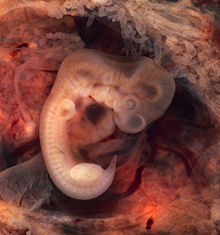embryo


The or the embryo ( ancient Greek ἔμβρυον Embryon ; from ἐν "Young", "Newborn", "Unborn" s "in" and βρύειν bryein "sprout let swell", plural: embryo or embryos ), and the seed or seedling , is a living being in its early stages of development.
Embryology deals with embryonic development - the differentiation of cells, the formation of tissues, the creation of organs, the formation of body shapes and the associated functions and services .
development
In humans and animals , the egg cell fertilized by a sperm , the zygote , develops into a new organism. This is called an embryo as long as it is in the mother or in an egg shell or egg shell.
In the prenatal development of humans, the early phases up to the formation of the internal organs ( organogenesis ) are referred to as the embryonic period and the months following this - from the ninth week of pregnancy after conception - as the fetal period . This is how the fetus or fetus is distinguished from the less developed embryo . Within the embryonic period can be scientifically the actual embryonic phase - between the fourth and eighth week of development from a - präembryonalen phase differentiate.
The pre -embryonic phase of the embryonic period in humans includes the first three weeks of development. In the first week p. c. The zygote develops through furrows over 2-, 4-, 8- and 16-cell stages the morula and from this the blastocyst , which anchors itself in the uterine lining ( nidation , about 6th day). The blastocyst shows a differentiation into cells of the outer trophoblast and the inner embryoblast .
The two parts develop differently in the following. While the trophoblast creates protective, nourishing and nourishing structures for the germ , the embryoblast continues to develop into a germinal disc with first two and then three germ layers at the end of the third week of development. This three-leaved embryonic disc then folds at the beginning of the fourth week into an early form of the embryo - with the start of the embryonic phase. From the extraembryonally named portions are u. a. The membranes, placenta and umbilical cord that are separated from the child after birth ( afterbirth ).
Legal meaning of the embryo
The term embryo can be used in the legal sense to define the belonging of cells to an independent living being, in particular one that can develop into a human being and therefore enjoys special protection.
In his 2014 opinion, the Advocate General of the European Court of Justice ( ECJ ), Cruz Villalón, defined the human embryo as a being that can develop into a human being from the moment of fertilization. In contrast to this, the Luxembourg judges also previously considered unfertilized egg cells that were stimulated to divide as embryos.
According to German law, the embryo is only considered to have been received once it has implanted in the uterine lining (nidation). Before that, he has the legal status of a nondum conceptus (“not yet received”), then that of a nasciturus (“will be born”) until birth.
literature
- T. Sadler: Medical Embryology. 10th edition. Thieme, Stuttgart 2003, ISBN 3-13-446610-4 .
Web links
- Online embryology course for medical students at the universities of Friborg, Lausanne and Bern
- Human development facts. University of Mainz
Individual evidence
- ↑ a b Keith L. Moore, T. Vidhya N. Persaud: Embryology . 5th edition. Elsevier / Urban & Fischer, Munich / Jena 2007, ISBN 978-3-437-41112-0 , p. 571 f.
- ^ Liddell-Scott-Jones: A Greek-English Lexicon . 9th edition, Clarendon Press, Oxford 1940, ἔμβρυον [2003], ISBN 0-19-864226-1 , or keyword "e) / mbruon" in Perseus.
- ^ Wilhelm Gemoll , Karl Vretska: Greek-German school and hand dictionary. 9th edition [reprint], Hölder-Pichler-Tempsky, Vienna 2006, ISBN 3-209-00108-1 .
- ↑ a b Embryogenesis on embryology.ch, the online embryology course for medical students, developed by the Universities of Friborg, Lausanne and Bern (Switzerland); accessed on August 1, 2018.
- ↑ Opinion of the Advocate General of the European Court of Justice (ECJ) in Luxembourg on the concept of embryos in Case C-364/13 , in particular Opinion (ECLI: EU: C: 2014: 2104) of July 17, 2014.
- ↑ Dagny Lüdeman: Embryo definition: An embryo is everything that a person can become . Spektrum.de; Retrieved July 21, 2014.

